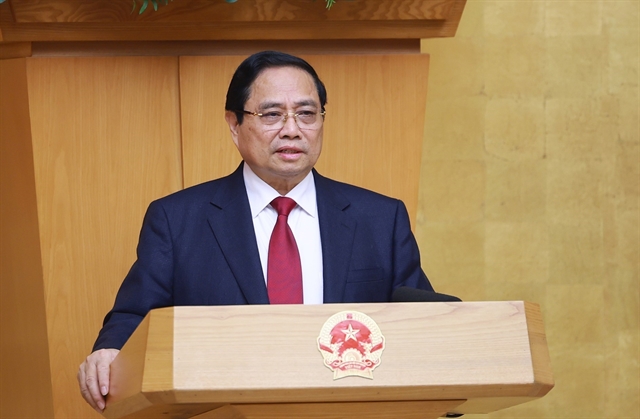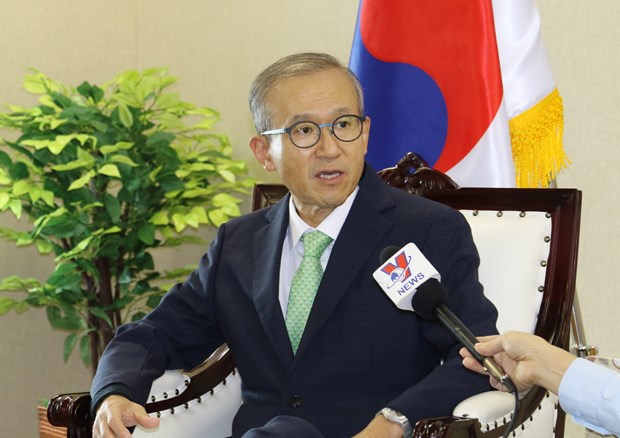 Politics & Law
Politics & Law


|
| Ambassador of Republic of Korea to ASEAN Lim Sungnam. VNA/VNS Photo |
Ambassador of Republic of Korea to ASEAN Lim Sungnam granted an interview with Vietnam News Agency corresponsdent based in Jakarta, Indonesia, highlighting the outcomes of the 37th ASEAN Summit and Related Meetings.
How do you access the results of the last ASEAN, APT, EAS and ASEAN-Republic of Korea Summits? What are the messages conveyed by the RoK at these meetings?
I think last week's ASEAN summits was all great success. I think Việt Nam did a very good job and the summit was a great success in three regards.
First and foremost, the ASEAN together with the dialogue partners, and the regional community could confirm the commitment to fight the COVID-19 in a very cooperative manner.
And number two, the ASEAN also charted a blueprint for the post pandemic economic recovery, which is called the ASEAN comprehensive recovery framework. And that was very much supported by the regional community as well, of course, including Korea. So in economic sense, it was also a great success. And last but not least, the signing of RCEP was another historical milestone. RCEP will be a very important regional framework, so which we can further expand the trade and investment regionally and globally.
And from Korea's perspective, the summit last week was also an important occasion to convey our continued commitment to continue to upgrade the level of cooperation with ASEAN. More specifically, President moon Jae-in unveiled the new Southern policy plus, on the occasion of the ASEAN-Korea summit, and through the new Southern policy plus, we will be aiming to continue to further upgrade the existing new Southern policy. And more specifically, we will try to expand the areas of cooperation, in particular in seven core areas, including healthcare and Human Resources Development.
And at the same time, ASEAN support for the peace and stability on the Korean peninsula was very meaningful and very important. And as always, we highly appreciate ASEAN support for our position on the important issues related with the peace and stability on the Korean peninsula.
What are achievements of cooperation Republic of Korea-ASEAN in this year? What are policies and strategic directions on Republic of Korea partnership with ASEAN in the coming time?
I think this year, Korea did prove to the ASEAN that a friend in need is a friend indeed. We are all in very difficult times in particular because of the COVID-19. But despite the difficulties caused by the COVID-19, I think Korea and ASEAN also have taken advantage of the crisis to show to the world and to show to the ASEAN that Korea is a true friend of ASEAN. For instance, Korea did launch the mega project worth US$5 million for enhancing the detection capacity of ASEAN member states for COVID-19. And at the same time, Korea contributed $1 million dollars to ASEAN COVID-19 response funds. And we were the very first dialogue partner which has made a meaningful contribution to that fund. So we believe that we have made a meaningful contribution in that regard.
And at the same time, Korea did launch a number of human resources related initiatives together with ASEAN, utilising the ASEAN-Korea Cooperation Fund. So through these human resources related projects, we hope that we can cultivate the Human Resources potential of the ASEAN member states so that ASEAN can do play a bigger role in the future, as Korea could do so through the enhanced education in the 1960s and 1970s.
And if you are interested in knowing more about the future direction of Korea's policy toward the ASEAN, you should pay attention to the new Southern policy plus. Again, that is the initiative unveiled by President Moon Jae-in last week on the occasion of the ASEAN-Korea summit. And through that policy, we will continue to upgrade the level of cooperation in seven key areas, including health care, Human Resources Development, Trade and Industry, cultural exchanges, non traditional security, infrastructure, and the fourth industrial revolution.
How has Việt Nam performed its role as ASEAN Chair in this year, especially in the challenging context of the COVID-19 pandemic and growing tension in the region?
Hà Nội did a superb job. The sheer number of the outcome documents adopted by the ASEAN summit last week, which is more than 80 is a proof that Việt Nam has turned a crisis into an opportunity for success. Everybody was concerned about the possibility that the COVID-19 might impact the ASEAN related summit meetings. But despite all those difficulties, we now can tell with great pleasure, that the meetings were great success.
How do you evaluate the signing of the Regional Comprehensive Economic Partnership (RCEP)? What does this agreement mean in the context of the global economic downturn caused by the COVID-19 pandemic?
Well, as we all know, RCEP is now the world's largest FTA. RCEP comprises about 30 per cent of the total population, total GDP and total trade volume of the world. And perhaps in the midst of unilateralism and protectionism. I think RCEP will be recorded in the history of international relations as a harbinger signaling the restoration of multilateral trading system, and in particular, in the era of COVID-19. And in the post pandemic years, RCEP will provide a platform upon witch, the region as well as the global community will be able to recover from the economic recessions brought about by the COVID-19 as well as possible.
What does the Republic of Korea expect from RCEP? How will this agreement affect trade between Republic of Korea and ASEAN?
ASEAN has been Korea's second largest trading partner, and Korea has been ASEAN's fifth largest trading partner. And ASEAN has been number two destination of Korea's foreign direct investment. All these trade and investment ties will be further bolstered by the RCEP.
First and foremost, tariffs for several products were lowered by the RCEP. Therefore, I'm sure in the coming months in the years, Korean consumers will be able to enjoy tropical fruits such as papaya, guava, and mangosteen at a much more reasonable price in the future. And at the same time, because the tariffs for beer will be zero. I'm sure Koreans will be able to enjoy Hanoi Beer or Saigon Beer. And likewise, Korea's automobile and steel industry will benefit from RCEP but that also means there is a huge potential for Korea's investment in the automobile and steel industry in the ASEAN countries. One example is Indonesia. Hyundai is now building a large scale plant for producing automobiles. That can happen in many other ASEAN countries at the same time.
Number two, RCEP has new regulations for e-commerce. In the years of the COVID-19 and in the post pandemic period, the virtual and non-contact transactions will be very important. So those new regulations for e-commerce will provide a platform on which ASEAN and Korea can engage in further cooperation in particular in the area of virtual transactions.
In your opinion, what ASEAN countries have to do to well exploit the opportunities, as well as to prevent the unwanted impacts from RCEP? What can Republic of Korea do to help ASEAN countries?
It might be too early to talk about the details of our cooperation with the regard to the implementation of RCEP, because RCEP should come into force first. And RCEP should be ratified by at least nine countries which have signed the treaty. But I'm sure when the RCEP comes into force, Korea and ASEAN will continue to engage in very technical and very detailed discussions. So the RCEP could it be a mutually beneficial platform for the economic prosperity of not just one country, but the regional community, including ASEAN and Korea. One of the key goals of new Southern policy plus is to create the foundation for sustainable and mutually beneficial trade and investment. And that's more or less in line with ACRF (ASEAN comprehensive recovery framework).
So we already have two frameworks. One is Korea's new Southern policy Plus, the other is ASEAN ACRF. So by utilizing those two frameworks, I'm sure Korea and ASEAN will continue to cooperate very closely for the mutually beneficial operation of the RCEP and at the same time to create the people-centered community of prosperity between ASEAN and Korea in the coming years. VNS




